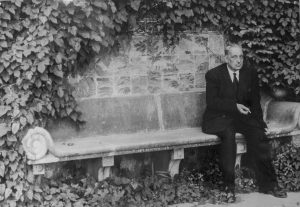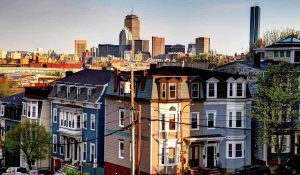by Robert Fay
Near the end of Italy’s greatest 20th century novel, The Leopard by Giuseppe di Lampedusa, the elderly Prince Salinas is slumped in an armchair on a Sicilian hotel balcony looking at Mounte Pelligrino. The Prince knows he’s dying, but even more poignantly, he understands centuries of Salinas aristocratic mores and traditions will soon die with him. It is 1881 and a unified, republican Italy has recently displaced the monarchial customs and feudal relationships of the Kingdom of the Two Sicilies. The Prince has witnessed the complete collapse of his world within two decades. And though he has an heir, his grandson Fabrizietto, the boy is “odious” and incapable of protecting the sacred Salinas patrimony. He is a product of this new, republican age, “with his good-time instincts, with his tendency to middle-class chic.”
Lampedusa’s narrator describes the Prince’s loss this way: “for the significance of a noble family lies entirely in its traditions, that is in its vital memories. And (the Prince) was the last to have any unusual memories, anything different from other families. Fabrizietto would have only banal ones like his schoolfellows, of snacks, of spiteful little jokes against teachers…”

Trying to elicit sympathy for elites is generally a fool’s errand, but Lampedusa is such a master, that any unprejudiced reader of The Leopard will surely be moved by the enormous humanity of the Prince. He is undoubtedly a snob, but his snobbery is like the egoism of a fighter pilot or the boastful pride of a mother, which is to say, it is in inseparable from their mission, their vocation. The power of this portrayal undoubtedly stems from the personal pain and loss in Lampedusa’s own life. He was born in 1896 to an aristocratic family and in 1943 his beloved family estate in Palermo—the seat of the Lampedusa family for centuries—was destroyed by U.S. Army Air Corps bombers during World War II. It was a loss that Lampedusa could never reconcile himself to. He had believed he’d die in that house, just as all ancestors had.
There is an echo of Lampadusa’s fate in the life of fellow aristocrat and novelist Vladimir Nabokov, who lost his ancestral estate(s) in Russia to war and politics. The Nabokovs had roots dating back to a 14th Century Tartar prince, but the cadres of the Bolshevik Revolution cut those ties in 1918, seizing the family’s properties and forcing them into exile. Nabokov never got over this loss. In a 1964 interview with Playboy he explained why he’d never bought a house in America, despite being a resident for 20 years, “…the background reason, is, I suppose, that nothing short of a replica of my childhood surroundings would have satisfied me. I would never manage to match my memories correctly—so why trouble with hopeless approximations?”
*
I was recently in Barcelona, where I walked the streets of the Barri Gotic, the Gothic Quarter, gawking at all the extant medieval architecture, the reminders the early centuries when an independent Catalunya had rivaled Venice in its riches and Mediterranean commercial activity. As I explored the city, I repeatedly spotted Catalan flags and campaign-style placards hung from wrought iron balconies. Catalan citizens were demanding that the federal Spanish authorities (Madrid) release the political leaders that had been jailed after the last year’s independence referendum in Catalunya.
I had just come from Madrid by train, and it was immediately obvious to me how different Barcelona was from the Castilian interiority of Madrid. It’s hard to imagine Frank Gehry’s gawdy, gold-metal Fish sculpture in Madrid, and not simply because Madrid is landlocked, but because the city doesn’t feel like it has landed entirely sure-footed and settled in the 21st century yet. It’s reportedly a progressive city when it comes to sex and gender equality, but somehow its museums and palaces remind one that Spain was more itself during the days of Isabel and Ferdinand, overseas gold, and the swagger and swindle of soldiers and priests.
And then when you come to learn that Gaudi, Dali and Joan Miro were all Catalan, and not Spanish, and that Picasso, though born in Malaga, Spain, moved to Barcelona when he was 14—you begin to rethink your whole notion of Spanish art and even Spanish culture at large. How differently would we view the genius of French literature, for example, if Proust, Balzac and Stendhal were in fact Belgian?
Despite Catalunya’s political troubles with Madrid, there would appear no danger of Catalan culture and language disappearing any time soon, and it would seem reasonable one day to imagine an independent, E.U.-member Catalunya. Yet one morning as I walked across a street in the trendy Eixample section of the city, I glanced down at a manhole cover and recalled something I’d read about the former Prussian city of Königsberg. It had been the birthplace of Kant and home of Prussian monarchs and Germanic culture for centuries.
It was as German as Seoul is Korean today, yet in 1945 the city, its people, heritage and culture were snuffed out, wiped from the map of history. Today the city is called Kaliningrad and it is a part of Russia and is as Russian as Moscow. Neil MacGregor is his book Germany (2014), writes:

“Between 1945 and 1989 the Soviet authorities, in what must be a classic case of Stalinist eradication of memory, demolished most of what had already not been destroyed (during World War II). Every place name and street was changed and the cradle of the Prussian monarchy was transformed into a modern Soviet city. Kant’s Königsberg vanished.”
The city had been captured by the Red Army as they battled west fighting the Germany Army. In the aftermath, during the Potsdam Conference in 1945, the Allies redrew the map of Europe, instantly turning tens of thousands of German-speaking people into refugees. The city of Königsberg was now a Soviet city and its German-speaking people were expelled.
MacGregor writes that in Kaliningrad today the only remaining trace of the city’s German heritage are the cast-iron manhole covers, which pre-date the war, and where you can still see the word “Königsberg” pressed into the iron.
*
But just as some civilizations, and their culture, can be eradicated from the earth through the violence of armies and the power of states, others remain stubbornly unchanged, “unprogressive” as it were, rooted and gnarled like stubborn olive trees.
Sicily, for one, has endured invasions and occupations over the centuries by the Romans, Greeks, Arabs, Spanish and others, and its people have also endured never-ending domestic terror from the Sicilian mafia.
In one of the most memorable scenes in The Leopard, the Prince is visited at his country estate in 1860 by Chevalley, a representative of the new Turin-based republican government, and they have come to recruit Prince Salinas to join them as a “Senator of the Kingdom,” because of his family’s name, his personal prestigious and his “liberal attitude during the recent events,” which refers to the landing of Garibaldi’s revolutionary troops in Sicily.
Prince Salinas ultimately refuses the government’s invitation, but not before giving the emissary a lecture on the nature of the Sicilian people, which he knows this northern-Italian gentlemen will never entirely grasp. “We are old Chevalley, very old,” the Prince says. “For more than 25 centuries we’ve been bearing the weight of a superb and heterogenous civilization, all from outside, none made by ourselves, none that we could ever call our own…for two thousand and five hundred years we’ve been a colony. I don’t say that as a complaint; it’s our fault. But even so we’re worn out and exhausted.” He later adds, “Sleep, my dear Chevalley, sleep, that is what Sicilians want, and they will always hate anyone who tries to wake them.”
The Prince also draws his visitor’s attention to the perfidious influence of the climate. “This landscape which knowns no mean between sensuous slackness and hellish drought,” the Prince explains. “Which is never pretty, never ordinary, never relaxed, as a country made for rational beings to live in should be.”
The Leopard is not a political book, but at the end of the novel the dying Prince understands the particular reign of his social class is over, to be replaced by a new elite composed of industrialists and merchants. Yet as much as he recognizes change at the top, he despairingly believes the fatalistic world view of the common people will remain unchanged, for Sicilians suspect there is no real difference between a Bourbon King and a Milan democrat.
When The Leopard was published in Italy in 1958 it caused a great stir, because it seemed to question some of the assumed good of the 19th century Italian unification project. As the country tried to move beyond the trauma of Mussolini and fascism, the book appeared to poke holes in the idea that a liberal democratic Italy was a glorious thing. It’s little surprise that Italian Marxists at the time embraced the book, seeing justifications in the text for their own rallying calls.
*
Loss and erasure of memory are some of the unexamined elements causing the societal fissures we see today in the western democracies. The populist, grass-roots rebellion against “elites” in the United States, France and the U.K. represent many things, but one of them is a nostalgia for the way their parents lived, worked and shopped in the 1950, ‘60s and ‘70s, when there were stronger trade unions, higher wages and more pathways to achieve upward mobility.
There are hundreds of factory and mill towns in the U.S. that have had their entire “culture” destroyed because powerful people made the decision to move manufacturing to Mexico, China and elsewhere. And while the fate of the Germanic-people of Königsberg was exponentially worse, there are parallels here in terms of powerful leaders—in this case Stalin, Churchill and Truman at Potsdam—making decisions that upend the lives of ordinary people, and there is not even the pretense of consultation.
*
In the 1970s my mother and I used to drive in from the suburbs of Massachusetts to visit my grandmother at the Marian Manor nursing home in South Boston. At the time, South Boston or “Southie,” as it was called, was still a fiercely parochial and insular Irish-American neighborhood of closely-knit blue collar people. It is a peninsula and physically separated from Boston by the expressway. The Irish began arriving in the late 19th century and South Boston slowly evolved its own norms and quirks over the decades, free from the mainstream culture of “Yankee Boston.”
For most Bostonians, Southie wasn’t a place you went to unless you lived there—and this was precisely the way locals liked it. The residents boasted of safe streets and neighborhoods were people looked out for one another, but it also had a well-deserved reputation for racism, and its residents fiercely resisted the racial integration of its schools and public housing projects well in the 1970s.

As a sheltered, suburban kid, Southie scared me. The boys my age looked tough-as-hell and I despaired of all those narrow streets hemmed in by three-deckers and parked cars, not a single tree or patch of grass in sight. The endless corner taverns sans windows and all those barrel-chested men with skally caps and cigarettes jammed in their mouths. In the early 1990s, I rented a room on Silver Street in Boston as a college student and discovered that little had changed. Despite being white and Irish-American, I remained an outsider, and was constantly harassed by the local toughs.
I haven’t been to Boston in years, but I’ve read that South Boston, like former blue-collar neighborhoods everywhere from San Francisco to Brooklyn, has been transformed by gentrification. Southie is now the jewel of the Boston real estate market, where prosperous young couples compete for old homes close to Carson Beach. The predictable menu of gentrification has hit, and blue-collar residents are enduring great strains.
I picture an old man on the top floor of white-clapboard three-decker on Dorchester Avenue—“Dot Ave,” in the old patois—slumped in a Lazy Boy recliner. He is in his eighties. His name is something like Daniel Leary or Michael Riordan. His parents, or perhaps his grandparents, were born in County Cork or Galway. He would have worked as an Iron Worker or maybe as a mechanic for the MTA. He’d have likely been to hundreds of masses and baptisms at St. Brigid’s, though he’d tell you didn’t like the Church much, and cared for the priests even less. He doesn’t understand what’s happened to Southie. It just happened. And like Prince Salinas, his sons and daughters live in circumstances beyond his understanding—and if he’s frank with himself—he admits their choices and lives have disappointed him.
He finds it’s all gone now. The world. His world. The world of his childhood, a world that was once so vital—a world that whispered and seduced him. A world that said, “I’m real. Real and eternal. What is, will always be.”
And how could it be any different? Is it really possible for a people—an entire way of life—to simply vanish without a trace, leaving nothing more than a speck, nothing more than a name on a manhole cover?
Robert Fay’s essays, reviews and stories have appeared in The Atlantic, The Millions, The Los Angeles Review of Books and The Chicago Quarterly Review, among others. He is co-creator of the Feeling Bookish Podcast. Follow him on Twitter @RobertFay1.
